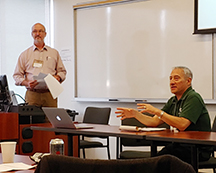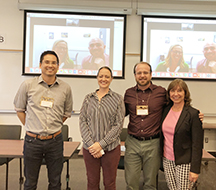Two Knight Center faculty presented some of their latest research at the recent Conference on Communication and the Environment at the University of British Columbia in Vancouver.

Knight Center director Eric Freedman and University of St. Thomas Professor Mark Neuzil.
In one paper, center director Eric Freedman examined the state of environmental journalism in the Republic of Georgia, where he spent the fall 2018 semester teaching journalism at Caucasus University and conducting research through the Fulbright Program.
Based on interviews with journalists, representatives of environmental and multinational organizations, scientists and other experts, the paper identified major barriers to effective environmental journalism in the country: the environment’s lack of priority among news media owners and politicians; staff shortages at news organizations; journalists’ inadequate substantive knowledge about the environment; and the costs of coverage.
Freedman’s second conference paper examined the National Park Service’s media strategy and techniques after it announced plans to translocate wolves from the U.S. and Canadian mainland to Isle Royale National Park in Lake Superior. His coauthors are Professor Mark Neuzil of the University of St. Thomas in St. Paul, Minnesota, and Alexander Killian, a Ph.D. student at Boise State University who earned his master’s degree in fisheries and wildlife at MSU.
Since the Park Service announced its controversial new wolf management plan, the agency has provided detailed information to the media while prohibiting – for espoused scientific and logistical reasons – a physical media presence on the mainland during captures and on Isle Royale during the releases. The paper included a content analysis of how the U.S. and Canadian press covered the translocation decision and early animal releases from June through November 2018.

Prof. Bruno Takahashi and fellow panelists
Center research director Bruno Takahashi presented about his experience developing and implementing an education abroad program on environmental communication in Peru. The presentation provided an overview of the pedagogical components of the program, the challenges in organizing the program logistics, the outputs produced by students and the learning objectives and associated assessments of the program.
The presentation also covered the opportunities that education abroad programs present to students to interact with a different culture and learn about environmental communication theories, concepts and practices and their application to a different context than their own.
